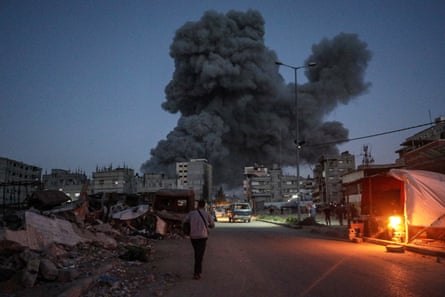Israel’s leader, Benjamin Netanyahu, is no stranger to scandal. Over three decades in politics, the 75-year-old has been accused of everything from spending excessive public money on ice-cream and striking deals with media outlets for favourable coverage to undermining trust in public institutions and the rule of law. In November, the international criminal court announced it was seeking his arrest for alleged war crimes in the conflict in Gaza.
To date, the prime minister has always managed to find a way to cling on to power – and public support. But even for “King Bibi”, as he is known to both supporters and detractors, this has been a difficult week, as a new scandal known as Qatargate gains momentum.
On Monday, while Netanyahu was attending a hearing in his corruption case at the Tel Aviv district court, the prime minister was forced to interrupt his own testimony to respond to an urgent police summons after the arrest of two of his aides.
Jonatan Urich, one of Netanyahu’s most trusted advisers, and Eli Feldstein, hired as a spokesperson by the prime minister’s office shortly after the war broke out, are suspected of taking money from Qatar, funnelled via a US lobby group, in order to promote a positive image of the Gulf state in their briefings to journalists. Lawyers for both men have declined to comment on the allegations.

It is believed that the aim of the alleged Qatari campaign was to improve Doha’s standing among Israelis, and with the US, while it was mediating ceasefire talks between Hamas and Israel – and to spread negative messages about Egypt, the other leading mediator in the negotiations.
The affair has deeply shocked the Israeli public because Qatar is widely viewed as a patron of Hamas, hosting leaders of the Palestinian militant group in the capital, Doha. Last year, Israel banned the Qatari state-funded media network Al Jazeera, which is fiercely critical of Israeli actions in the conflict.
Doha has sent millions of dollars in aid to the Gaza Strip, facilitated by the Israeli government – but some in Israel allege Qatari money was used to help Hamas prepare for the 7 October 2023 attack that precipitated the war.
Netanyahu is not a suspect in the case, and has railed against the investigation as a “political witch hunt”. Qatar denies it supports Hamas, and in a statement on Thursday called the claims it paid Israeli political actors in an attempt to influence public opinion “baseless”.
However, if the allegations are substantiated, the premier faces serious questions about how a foreign power seen by many as an enemy state was able to infiltrate the highest levels of the Israeli government.
“It’s a serious blow to Netanyahu’s soft underbelly,” columnist Ravit Hecht wrote in left-leaning Israeli daily Haaretz last week.
“The questionable ties with Qatar add to a heavy accumulation of suspicions and scandals, which may validate the sense of disgust felt by many of Netanyahu’s former supporters after 7 October, pushing them one step further away.”

That Netanyahu is afraid of the political damage Qatargate could inflict is apparent in his handling of an overlapping scandal – his decision last month to hold a cabinet vote on firing the director of the Shin Bet, or general security service, Ronen Bar.
It is no secret that there were longstanding tensions between the prime minister and the security chief, who was appointed by the short-lived government that ousted Netanyahu from office for 18 months in 2021.
Relations between them were strained even before the 7 October Hamas attack, notably over the Netanyahu coalition’s proposed judicial overhaul, which sparked widespread protests and allegations of democratic backsliding.
The relationship further deteriorated after the release of a Shin Bet investigation acknowledging the agency’s failures in predicting the Hamas 7 October attack but also pointing to wider policy issues in the run-up.
But the agency’s decision to launch the investigation into Netanyahu’s aides over Qatargate, as well as the leaking of manipulated classified documents to foreign media outlets, and Bar’s refusal to provide a security assessment that would allow Netanyahu to avoid appearing in court in his trial, seems to have finally pushed the prime minister into taking steps to remove him. Netanyahu maintains there was a “breakdown in trust” between the pair.
The move to fire Bar was suspended by the supreme court, which is due to consider the case on 8 April – but last week, Netanyahu attempted to appoint former navy chief Eli Sharvit as replacement director anyway, only to rescind the offer within a day, after backlash from members of the prime minister’s Likud party claiming that the candidate was too liberal.
On both fronts, the scandal may yet widen. A judge has extended Urich’s detention in police custody, and Feldstein has been released to house arrest; Israel is gearing up for a constitutional crisis if the supreme court overrides the cabinet decision in favour of Bar’s dismissal.
“Every line has already been crossed … That Netanyahu politically survived the 7 October massacre is an incomprehensible testament to the fact that Israel in 2025 is a completely lawless place,” Hecht said.
As ever, what happens next hinges on the prime minister’s formidable instinct – and redoubtable talent – for self-preservation.

.png) 1 day ago
2
1 day ago
2













































